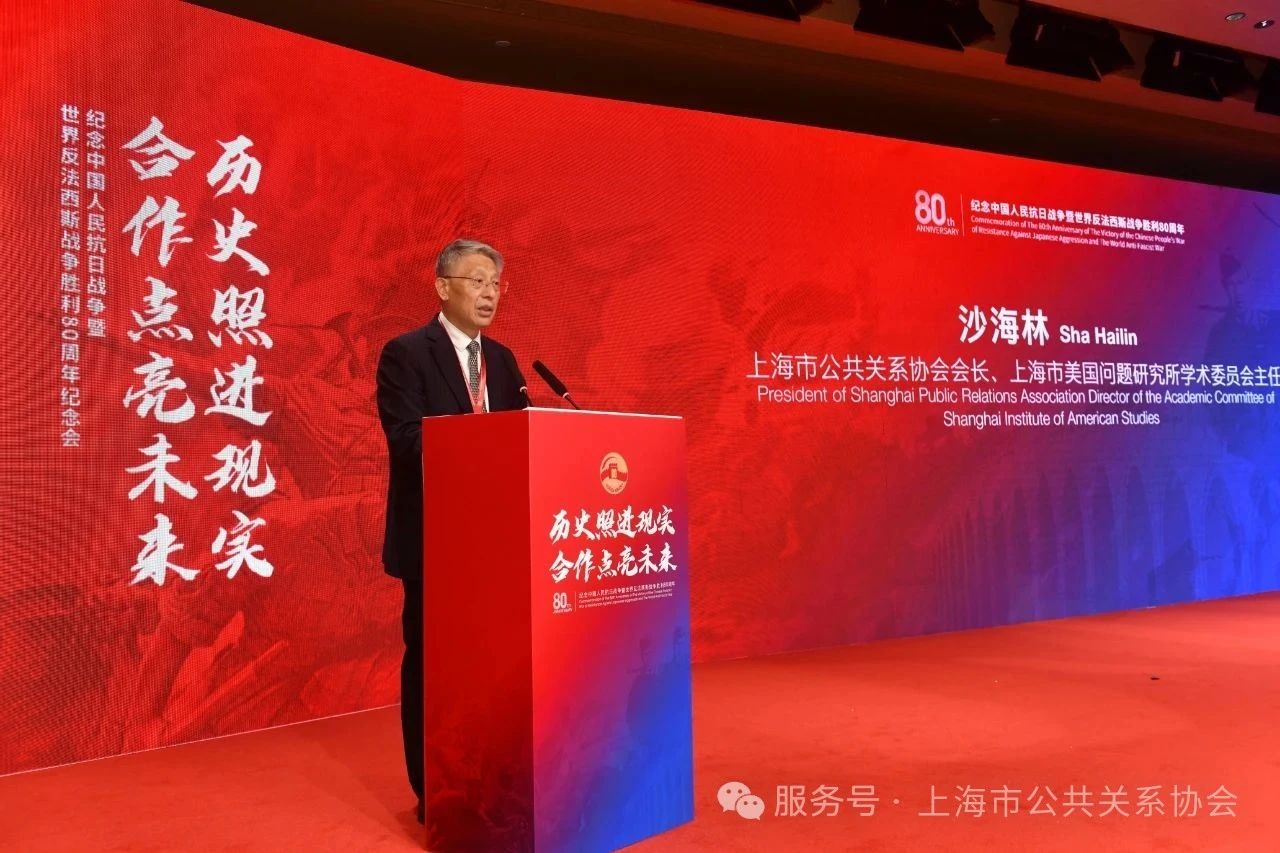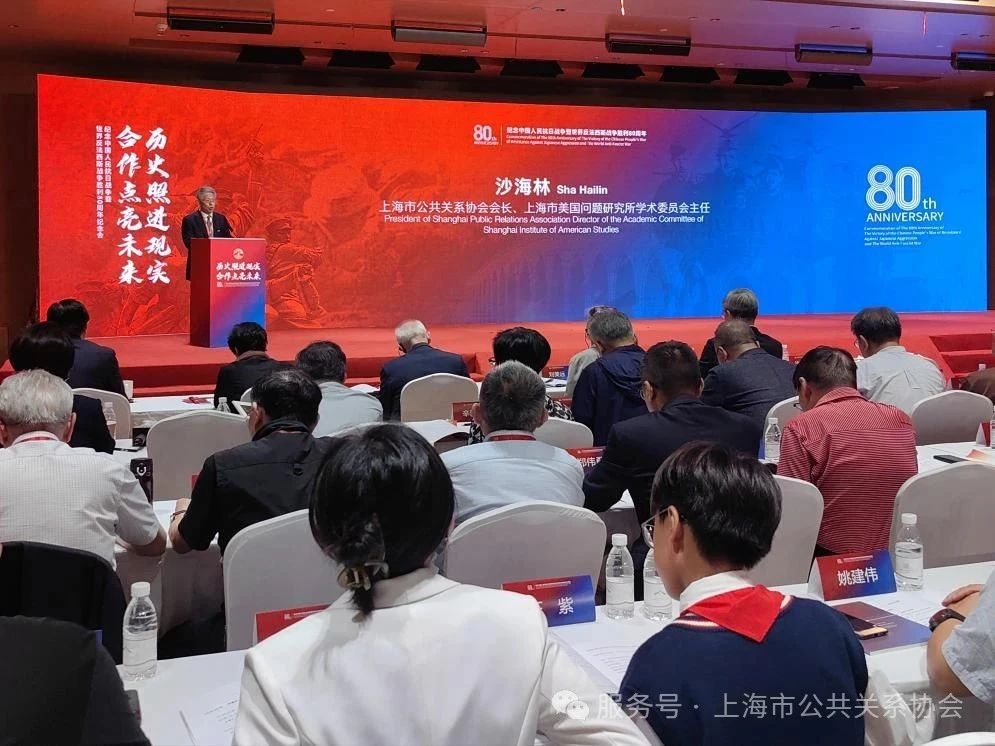Speech by SPRA President Sha Hailin at the "History Illuminates the Present, Cooperation Lights the Future" Themed Exchange Meeting

Distinguished guests and friends,
Good afternoon!
Today, we gather here with great excitement to jointly commemorate the 80th anniversary of the victory of the Chinese People's War of Resistance against Japanese Aggression and the World Anti-Fascist War. We have just opened the "Friendship: Forged in Blood and Fire" themed exhibition, from which we can see the pivotal role of the Communist Party of China in the national united front against Japanese aggression, the historical scenes of the Chinese people sharing a common hatred for the enemy and fighting side by side with people from all over the world, including the American people, and the profound friendship forged by the people of China and the people of the United States in blood and fire. Looking back at this period of history, the most touching thing for me is the power of the word "trust". To elaborate, it can be summed up in three sentences: Faith knows no bounds, confidence can overcome all difficulties, and trust builds the future.
First, faith knows no bounds. In the early 1930s, Robert Short, an American, was hired to sell Boeing aircraft in China. He witnessed the Japanese atrocities and in anger, decided to join the Chinese People's War of Resistance against Japanese Aggression. On the evening of January 28, 1932, the locally stationed Japanese troops launched an attack on Shanghai, and the Japanese Air Force carried out indiscriminate bombing on the city, which enraged Robert Short. He immediately took off with a Boeing P-12E demonstrator to confront the enemy, shooting down two Japanese aircraft and damaging one. On February 22, 1932, Short flew alone in a fighter jet to Jianqiao Airport in Hangzhou. In the sky over Suzhou, he encountered a formation of six Japanese naval aircraft led by Lieutenant Susumu Kotani of the Japanese Navy's First Air Force. Short attacked first and shot down one Japanese aircraft. However, he was outnumbered and died heroically at the age of 27, becoming the first American pilot to shoot down an invading Japanese aircraft, kill a Japanese naval air commander, and sacrifice himself in the Chinese fight against the Japanese invaders.
In 1941, American flight instructor Chennault led the "Flying Tigers" all the way to join the Chinese People's War of Resistance Against Japanese Aggression. The Flying Tigers shuttled through the "Hump Route", which was also known as the "Death Route". Over the course of three years, more than 800,000 tons of supplies were airlifted to China via the Hump Route, making it almost the sole channel for the delivery of Allied supplies to China. During their aid to China, the Flying Tigers shot down over 2,600 Japanese military aircraft, sank or damaged 44 ships, and killed more than 60,000 Japanese soldiers. In all, 2,193 American Flying Tigers members were killed in action, and over 200 Flying Tigers members were rescued by the Chinese people. In the Pudong area of Shanghai, there were stories of American pilot rescue by Chinese soldiers and civilians. When the fighter planes soaring in the blue sky and the beacon flames on the ground shined together, the faith to uphold fairness and justice in the international community transcended nationality and skin color, becoming a common vow to safeguard peace.
The legendary stories of faith and trust across the Pacific Ocean also occurred in the mountains of southeastern China. In 1942, after the Doolittle Raid on Japan, 15 US bombers landed in the areas of Zhejiang, Jiangxi, Anhui, and Fujian in China due to poor communication, insufficient fuel, or bad weather. Local Chinese residents risked their lives to rescue 64 US pilots and successfully got them out of danger. The Doolittle Raid was the first US bombing of Japan’s homeland after its surprise attack on Pearl Harbor. It was also the first live-fire air raid on Japan in its national history. In retaliation, the Japanese army launched the Zhejiang-Jiangxi Campaign and brutally slaughtered 250,000 Chinese civilians. The impact of the bacterial warfare carried out by the Japanese army lasts to the very present day. The righteous people of both China and the United States defended peace and justice with their blood and lives.
During his visit to the United States in 2023, Chinese President Xi Jinping told his American friends: "The Chinese people have not forgotten the Flying Tigers." He spoke about the memorial hall in Chongqing and the correspondences he had with the veterans of the Flying Tigers, as well as about the Doolittle Raid Memorial Hall. He also mentioned that descendants of the American soldiers who were heroically rescued by the Chinese people often went to the memorial hall to express their respect. Over the course of more than eighty years, the friendship forged by faith and rust has been passed down from generation to generation in the hands of the Chinese and American peoples.
Second: Confidence can overcome all difficulties. Today, as we look back at the magnificent epic of the Chinese People’s War of Resistance against Japanese Aggression, we will find that what is truly inspiring is not only the glory of victory itself, but also the confidence that a nation can burst forth in a dire situation. In the spring of 1938, under the candlelight in the cave dwellings of Yan'an, Mao Zedong wrote On Protracted War, presenting the three-stage theory of "defense, stalemate, and counterattack" to dispel the fog of "national subjugation theory" and "quick victory theory". With its strategic vision of "a protracted war", the Communist Party of China pooled the confidence and will of hundreds of millions of compatriots, and held up the hope of national survival by shouldering its responsibility as the main force in the War of Resistance against Japanese Aggression.
It is worth mentioning that the birth of the English edition of On Protracted War was inseparable from the assistance of an American friend. Emily Hahn, whose Chinese name is Xiang Meili (“项美丽”), was a special contributor and China resident correspondent of New Yorker magazine. At that time, Yang Gang, who was an underground member of the Communist Party of China entrusted with the task of translating On Protracted War into English, became close friends with Xiang Meili due to their work. Under Emily Hahn’s cover as a foreign national, Yang Gang completed the translation work at his residence on Xiaofei Road (which is today’s 1754 Lane on Middle Huaihai Road in Shanghai), and Emily Hahn made suggestions for text and grammatic modifications. In early 1939, Mao Zedong wrote in the preface to the book-form edition of his On Protracted War: "Friends in Shanghai have translated my On Protracted War into an English edition. I was naturally delighted because the great Chinese People’s War of Resistance against Japanese Aggression is not only a matter for China and the East but also a matter for the world."
The ultimate victory of China's War of Resistance against Japanese Aggression demonstrates to the world that: even in the darkest moment, if a nation can clearly see the historical trend and unite as one, it will survive in adversity and defeat a stronger opponent. The underlying implication for us is this: in response to the unprecedented changes unseen in a century in the world, building a community with a shared future for mankind is not only a matter for China and the east, but also a matter for the world (including the United States). No war, be it trade war, technological war, tariff war, or new Cold War, is the historical megatrend; and all wars are unpopular countercurrents. The United States and China are closely intertwined, needing each other; and cooperation will lead to mutual benefit, while confrontation will result in losses for both sides. Of course, in the face of the extreme pressure from a tiny number of anti-China and opportunistic politicians in the United States, the Chinese people's attitude will have to be like this: we do not want to fight a war, but are not afraid of fighting one either. There is a common saying in China: "No discord, no concord." Despite the many difficulties facing China-US relations now, we still have confidence. We should concentrate our efforts and focus our minds on doing our own things well, and use the facts of cooperation and the strengths of development to speak for themselves. We believe that the people will eventually come together, and win-win cooperation is the only right way of survival, interaction and development.
Third, trust builds the future. When I was in Quzhou recently, I heard the following story: Liao Mingfa, the son of Liao Shiyuan, a Quzhou rescuer during the Doolittle Raid, once gave the key to his old home to Susann Ozuk, the daughter of one Doolittle Raid pilot. He told her, "This is the key to my home, and my home is also your home. You are welcome to come home anytime!" In reply, Susann Ozuk said with great meaningfulness in her words, "I will come back often!" This is friendship forged in blood and fire, which has transformed into the mutual trust between generations just like what is between relatives.
I would also like to particularly mention that today also marks the 100th anniversary of the birth of Madame Anna Chennault. During the Chinese People’s Resistance against Japanese Aggression, she worked as a war correspondent and won the trust of the Flying Tigers with her fluent English and professional skills as a journalist. Through her writings, she recorded many little-known battle stories, turning her pen into a sharp sword, exposing the atrocities of the Japanese army, and spreading the heroic tales of China-US cooperation. In the decades after the war, especially when China-US relations were in the low, Anna Chennault became a "bridge-builder" for dialogue between the two countries. She served several US presidents and was also recognized by Chinese leaders, being hailed as the "People’s Ambassador between China and the United States". She shuttled across the Pacific Ocean, becoming a bridge and bond for enhancing mutual understanding, comprehension, friendship and trust between China and the United States. Many of her stories often evoke such a call: How much do the current China-US relations need a "new generation of Anna Chennaults"!

Today, people are glad to see that the "Anna Chennault’s Spirit" is being passed on by the new generation of students at Jianping Anna Chennault Middle School. Flying Tigers Friendship Schools are being established in both China and the United States. The initiative and invitation issued by President Xi Jinping for “50,000 US Youth to Visit China in 5 Years” are enabling more and more American young students to set foot on Chinese soil. The seeds of trust are being sown among young people in China and the United States. We hope that they can grow vigorously and mature into towering trees to safeguard peace and justice, and become fragrant plum blossoms that will brave turbulent currents and cold winds.
Friends! The wheels of history continue to roll forward. Standing at the new starting point in history, we commemorate our victory not to prolong hatred but to safeguard peace; we remember history not to dwell on the past but to light the future: Let the flames of "faith and trust" be passed down from generation to generation, let the flags of "confidence" fly high for ever, and let the bridge of "trust" connect the future. The people of China and the people of the United States once stood shoulder to shoulder to defend peace with their blood and lives. Today, we should do even more to learn from history and work together to address global common challenges, allowing the gentle stream of friendly people-to-people relations to converge into a grand tide of the times characterized by win-win cooperation and efforts to build a community with a shared future for mankind.
Friends, let's strive for it together!
Thank you all!